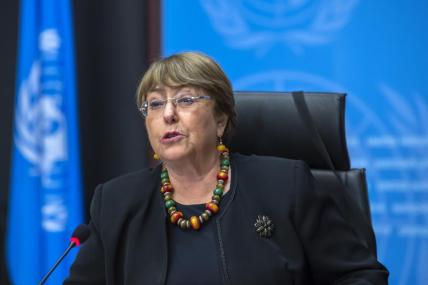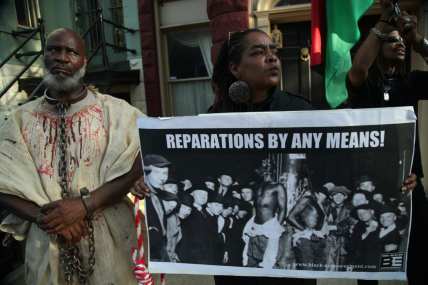Chicago woman, 73, finishes 40-day hunger strike for slavery reparations
"This is phase one, and I’m not going away."
A 73-year-old white woman has completed a 40-day hunger strike for slavery reparations to Foundational Black Americans (FBA).
Rachelle Zola lost 23 pounds and drank only water, Pedialyte, and bone broth during the last two days of the fast, as reported by the Chicago Tribune. She documented the journey on her YouTube channel.
Zola’s hunger strike was her way of supporting H.R. 40, a bill that would establish a federal commission to hold hearings on slavery and discrimination and recommend remedies. The bill was first introduced more than 30 years ago.
“My question to myself was, am I willing to die for this? And it became ‘yes’ because of all of the [Black and brown] people I know,” Zola said. “Am I willing to die for my brothers and my sisters when there’s an injustice? The answer is yes.”
Zola’s pro-Black mission began in 2019 when she traveled to Chicago from Tucson to meet and connect with Black and brown people. She attended church meetings and workshops and “occupied spaces” with anyone willing to discuss the Black experience. Zola said her goal was to listen, learn and attract the attention of other white people to support a reparations bill.
Zola is specifically calling for Congress to pass HR 40.
As previously reported by theGrio, in the past, activation of a study commission has been a first step toward establishing a program of redress for grievous injustice. For example, prior to the enactment of the Civil Liberties Act of 1988 — enabling legislation for reparations payments to Japanese Americans as compensation for their unjust incarceration during World War II — Congress created the Commission on Wartime Relocation and Internment of Civilians (CWRIC).
The CWRIC produced a study, Personal Justice Denied, that accomplishes two critical goals. First, it demonstrated that American officialdom had credible evidence that Japanese Americans were not a national security threat, but still proceeded with the internment project. Second, it outlined a program of restitution.
As a prelude to a comprehensive program of reparations for Black Americans, a parallel commission should be mobilized to produce a report that details the case and a plan for restitution. HR 40 provides the opportunity to establish such a commission.
Zola embarked on a hunger strike with the hope that the bill gained more traction.
Zola, who grew up on Long Island, said she didn’t have a Black friend until 2015. However, she is well aware that it’s easy for her fellow white Americans to turn a blind eye to the oppression and suffering of Black people.

“I look at myself as a case study,” she said. “How could I get to be this age and not know the harm? The quick answer is I wasn’t reading those books. I wasn’t reading ‘Just Mercy.’ I wasn’t reading ‘The New Jim Crow.’ I wasn’t reading any of it. What’s amazing now? ‘The Long Shadow’ — that documentary of 90 minutes — if that doesn’t touch your heart, I don’t know what will.”
Zola has lived and worked in Jordan, Japan, and Mexico as part of her work with the Peace Corps, and the skills and knowledge she has gained through her immersion in other cultures has given her a unique perspective on life and her privilege as a white woman.
“Things come up that she knows she can contribute to, or help, or be of service in some way, and that’s where she goes. That’s why she’s on the planet, I guess,” said her friend Diana Keck, 78, a psychotherapist in Boulder, Colorado. “She’s just an extraordinary woman, and I’m pleased to say one of my best friends.”
Now that the hunger strike is over, Zola is looking to hit the road and travel town-to-town to spread the word about reparations for FBAs. According to the report, she hopes to get speaking invitations at fundamentalist churches in the South.
“This is phase one, and I’m not going away,” she said.
Zola is also hopeful that H.R. 40 will pass by the end of 2022.
“Am I optimistic? Yeah, I have to come from that place. I do have to trust that,” she said.
Have you subscribed to theGrio’s “Dear Culture” podcast? Download our newest episodes now! TheGrio is now on Apple TV, Amazon Fire and Roku. Download theGrio.com today!


